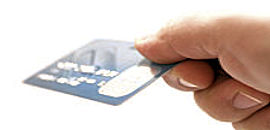Fraud Protection
Identity theft affects the lives and credit scores of millions of people annually. A little precaution can go a long way to keep you safe.
- Shred or tear up credit card & ATM charge receipts, credit card solicitations & bills, cancelled checks, account statements, expired cards & similar documents.
- Outgoing mail should be deposited at the post office rather than the mailbox, and incoming mail should be promptly removed to avoid thieves from gaining access to your personal information, especially in rural areas.
- Review your monthly bank & credit card statements promptly and carefully for any unauthorized activity. You can easily manage and keep a watchful eye on your Stockgrowers State Bank accounts with Online Banking. Report anything suspicious immediately. With the age of electronic transactions, fraudulent activity can easily slip by.
- Do not put the complete credit card account number on the memo of your checks when paying your bill. Instead, write only the last 4 numbers. This is all the information necessary for your payment to be applied correctly, and limits the information to those who might abuse it.
- Never give your personal information over the telephone! Be especially cautious of anyone posing as a law enforcement individual, bank representative, internal revenue service or someone from “prize headquarters”. A good rule of thumb is to never give information to anyone if you did not instigate the telephone call. Once a crook has access to your account number, they can create and issue drafts with your account number to steal funds directly from your account. Never “verify” your account number or social security number over the telephone or Internet.
- Use up-to-date virus protection & access controls regularly.
- Guard your social security number. Never carry it in your wallet, and avoid having it printed on your checks.
- Protect your passwords and PINs. Never lend them to anyone even if it’s someone you trust, they may be careless and leave it in plain view for a scam artist. Be mindful around the ATMs for “shoulder surfers”, persons watching to steal your PIN to gain access to your account(s).
- Question credit card denials that you receive for no apparent reason.
- Periodically check your credit report to see if there are any credit cards and or loans in your name that you didn’t generate. A free credit report is available at www.annualcreditreport.com.
- Do not share your PIN to anyone and don't keep it written down anywhere in your purse or wallet.
- Do not use public wireless access for financial transactions.
Phishing is an attempt to steal confidential information from consumers via the computer, through the use of "pop-ups" or emails. These emails have Internet links to deceive you into disclosing sensitive information such as bank account numbers and social security numbers. Oftentimes the email appears as if it comes from a trusted source and unknowingly directs you to a "spoof" website that encourages you to divulge sensitive personal information.
Skimmers are devices used to read the magnetic strip from your credit card or check card. They are often hidden in places where you legitimately use your card to make a transaction like an ATM or a restaurant. Your information is typically used within 24 hours of the skim to make online purchases.
When Information Is Lost or Exposed
Did you recently receive notice that your personal information has been exposed in a data breach? Did you lose your driver's license or other identifying information? Did you learn that your online account has been hacked? Depending on what information was lost, there are steps you can and should take to help protect yourself from identity theft. If you think you are a victim of fraud or identity theft, take action immediately. You can safely go to the Federal Trade Commission's site for guidance to protect your ID by clicking on the link below for the Federal Trade Commission's guide for lost or stolen ID.
Or, click here for a step-by-step fraud worksheet to assist you in protecting yourself NOW.
See our FRAUD WORKSHEET for more information.
Reach out to any of our Stockgrowers State Bank/Meade State Bank personnel with any questions or concerns.


